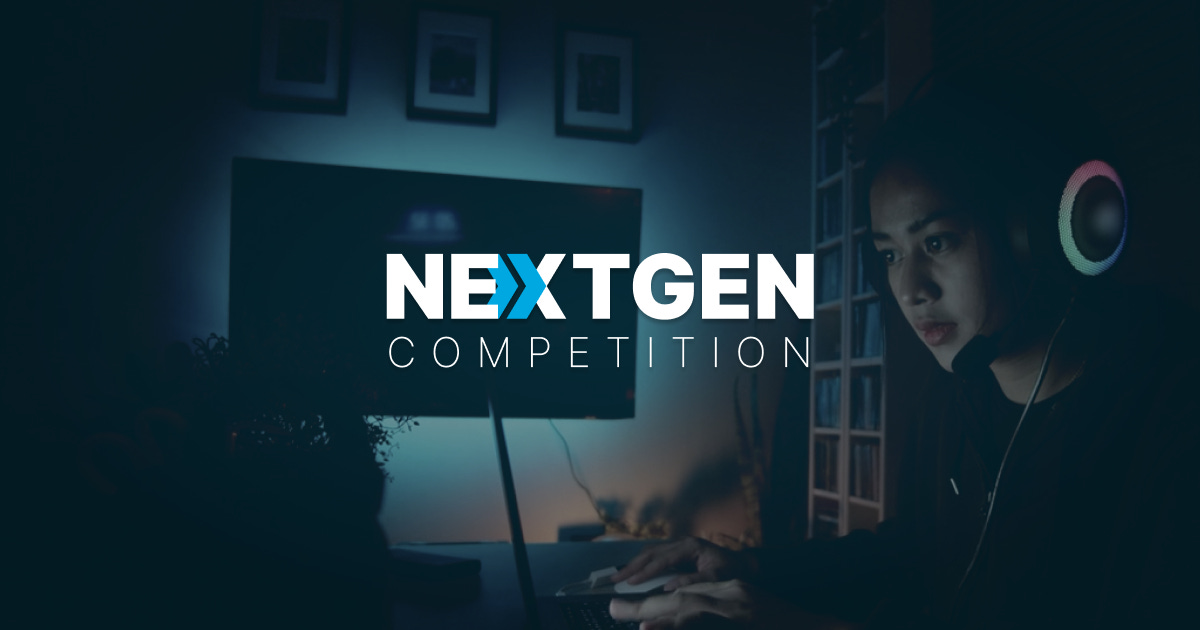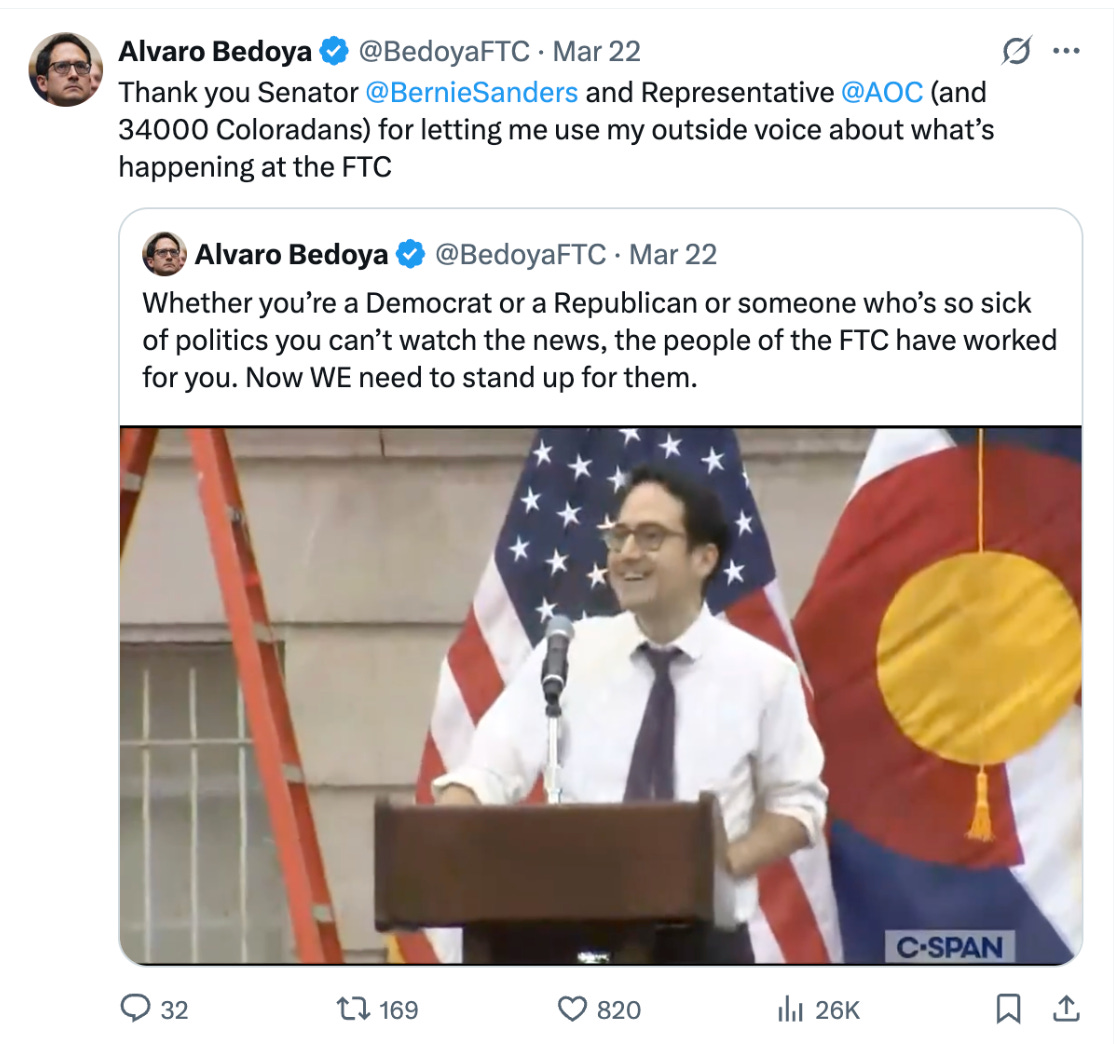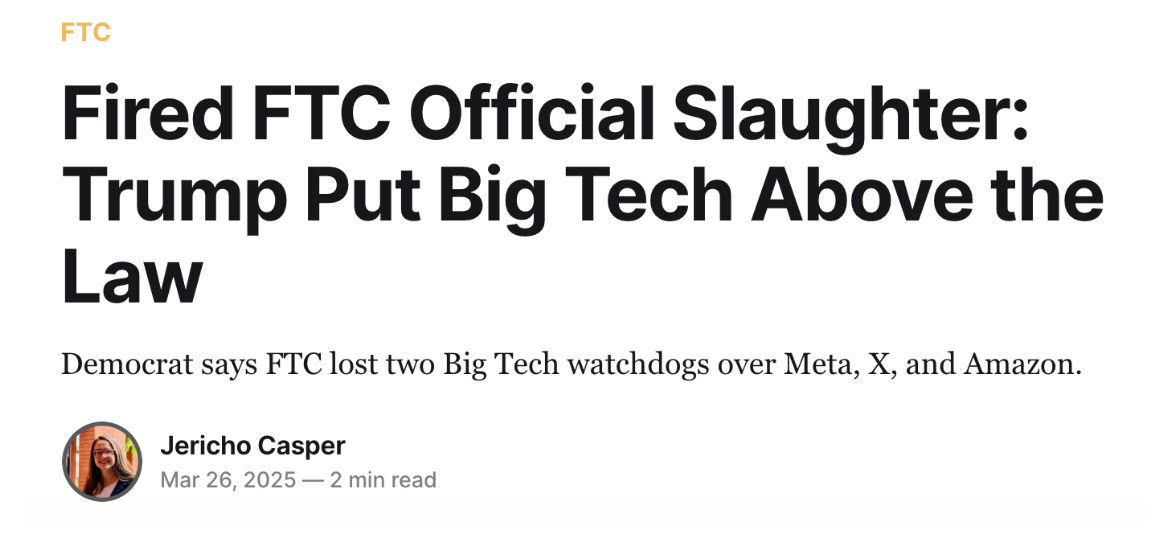Top Hat & Thimble - March 2025
Welcome to NextGen Competition’s newsletter, delivering insider insights on antitrust battles, industry shakeups, AI trends, and more.
It’s an honor to step into the role of leading NextGen Competition and to build on the impactful work George and the organization have championed: challenging the outsized power of Big Tech. This mission is essential to ensuring citizens have greater control of our economy’s productive capacity and the flow of information that shapes their decision-making.
By attempting to remove Commissioners Alvaro Bedoya and Rebecca Slaughter from the Federal Trade Commission (FTC), President Trump is moving in the opposite direction. As the American Antitrust Institute explains in its statement on the removal, these firings are illegal and the President knows this. And as Commissioners Bedoya and Slaughter underscored, this decision not only undermines the ability of all commissioners, including Republican commissioners, to enforce antitrust laws without fear or favor, but it will also make it easier for the largest tech companies to receive favorable treatment.
It is also an own goal as it undermines one of the areas where there is bipartisan support for action – ensuring that our anti-monopoly laws are effectively enforced so that the largest technology firms are held accountable. Gail Slater was confirmed to head the DOJ’s antitrust division by a 78-vote majority in the Senate. With this decision, it is unlikely Mark Meador’s confirmation as FTC commissioner will be as smooth or bipartisan.
Finally, the flip-flopping and uncertainty that has been an all-too-common characteristic of the Trump Presidency now also affects business planning and consumer protection. An FTC beholden to the President and whose enforcement is influenced by which way the political wind blows cannot provide the policy certainty that we all require to plan our lives and that businesses need to plan their investments. There is value in policy stability, as both Chair Ferguson and AAG Gail Slater have stated with regard to maintaining the 2023 Merger Guidelines.
Clearly, we have work to do. Thank you for reading and your support.
With regards,
Sumit Sharma
Executive Director
NextGen Competition
NextGen Competition Welcomes New Executive Director
We’re thrilled to announce Sumit Sharma as NextGen Competition’s new Executive Director. A seasoned economist and policy expert, Sumit brings deep experience in competition policy, regulatory affairs, and consumer advocacy. He has previously advised tech companies, regulators, and governments, and led antitrust efforts at Consumer Reports.
Sumit succeeds George Rakis, who will remain on our Board of Directors as Executive Director Emeritus. George served as Executive Director for two years and remains committed to our shared mission.
“I’m deeply grateful for the collaboration, insights, and shared victories we’ve achieved together. While I’m stepping down as Executive Director, I remain committed to this movement and look forward to supporting NextGen’s efforts in new ways. Our work is far from over.” - George Rakis
Bedoya and Slaughter: Antitrust Heroes Who Don’t Back Down
We strongly oppose the President’s decision to remove two sitting members of the FTC and support the commissioners’ fight to defend the independence of the FTC and the FTC’s ultimate accountability to Congress.
Speaking before a crowd of 30,000 at Denver’s Civic Center Park, Bedoya decried the President’s illegal attempt to fire him from the Commission. He drew roaring applause when he declared, “We are taking the President to court.” Bedoya also spoke to NPR Morning Edition's Leila Fadel calling the president's action "a naked power grab."
In her testimony to the House Commerce, Manufacturing, and Trade Subcommittee yesterday on consumer protection, recently-fired FTC Commissioner Rebecca Kelly Slaughter slammed the President’s decision to remove her and her fellow commissioner Alvaro Bedoya, stating:
“The illegal firings sent a clear message to the FTCs majority commissioners: You now work under the shadow of arbitrary removal by the President. Today's oligarchs have surely noticed that it is not the independent experts at the FTC or the courts who will decide their fate, but the President himself and I fear what corporate law breakers will get away with.”
We especially enjoyed Jericho Casper’s recap, with this amazing headline
Trump FTC Moves Forward with Microsoft Antitrust Probe
This month, news broke that FTC Chair Andrew Ferguson is moving forward with a sprawling antitrust investigation into Microsoft. The agency previously sent a civil investigative demand to Microsoft requesting data on its AI operations, including the cost of training models and obtaining data, as well as information on the company’s decision to cut funding for its own AI projects after striking a deal with OpenAI.
According to Bloomberg, the FTC is looking at Microsoft’s software licensing practices—which we’ve long argued are anticompetitive—and whether Microsoft’s relationship with OpenAI hurt competition in AI.
NextGen applauded the move, stating that “by staying the course, the FTC reaffirms its mission to promote fair competition and hold dominant firms accountable.”
Other Competition News
Headlines from the past month you might have missed:
Power Down: Harvard’s Electricity Law Initiative is out with a new report on Big Tech’s secret deals to make consumers pay for their insatiable energy demand driven by AI.
While data centers typically use around 4% of electricity, the influx is “forecast to account for up to 12% of all U.S. electricity demand by 2028.”
Ari Peskoe, report author and director of the initiative at the Harvard Law School Environmental and Energy Law Program, remarked, “We’re all paying for the energy costs of the world’s wealthiest corporations.”
Is writing a 100-word email using ChatGPT really worth a bottle of water? We think not but decisions driven purely by profit and the race to commercialize generative AI among the largest technology firms is unlikely to align with the public interest.
Reframing AGI: In a Bloomberg opinion piece, Parmy Olson calls out Big Tech for abandoning their once altruistic goals for artificial general intelligence (AGI) in favor of pursuing profit at all costs. AGI is the holy grail of AI: a hypothetical machine that can do anything a human can do intellectually.
AGI controlled by Big Tech could turn vision into nightmare, especially with a system smart enough to master every skill, outthink us, or even reshape civilization itself.
“Altman still talks about benefiting humanity, but he’s no longer a non-profit ‘free from financial obligations’ per his 2015 founding statement, and more of a product arm of Microsoft Corp., which has since sunk roughly $13 billion into his company.”
“The obsession with ‘bigger is better’ has gone on long enough in Silicon Valley, as has the jostling between people such as Musk and Altman to have the biggest AI model or the biggest cluster of Nvidia Corp’s AI chips.”
Warren’s Inquiry: Earlier this month, Senator Elizabeth Warren (D-MA) sent letters to Big Tech leaders, including Elon Musk, Mark Zuckerberg, Jeff Bezos, Tim Cook, and Sundar Pichai, probing their cozying up to the current administration and lobbying to benefit their companies.
“And this $75 billion windfall is only one slice of the billions of dollars that you stand to gain from Republican efforts to lower your taxes while raising costs for working families…American taxpayers will shoulder the burden of tax cuts…and they deserve answers about your efforts to secure massive tax breaks for billionaire corporations.”
Jessica Corbett of Common Dreams has the full scoop, including the questions Warren posed to the five tech leaders. Will we get answers? 🤔
Google’s Search Monopoly: While it’s unclear where the FTC’s cases will go amidst the recent commissioner upheaval, the DOJ is pressing ahead with its Google break-up request. We’ll be keeping our eyes peeled for next month’s hearing. 👀
“‘Google’s illegal conduct has created an economic goliath, one that wreaks havoc over the marketplace to ensure that — no matter what occurs — Google always wins,’ the government said in its Friday filing. ‘The American people thus are forced to accept the unbridled demands and shifting, ideological preferences of an economic leviathan in return for a search engine the public may enjoy.’”
And in other Google news, Google isn’t helping fix its monopolistic image as the tech giant is acquiring cybersecurity company Wiz for $32 billion. 😳
As Nico Grant of the New York Times writes, “The deal will test the company’s ability to conduct major acquisitions during protracted antitrust battles with the U.S. government.”
CNBC took it further, calling the acquisition a “litmus test” for the current administration.
Slater at the Helm: The Senate confirmed Gail Slater to serve as United States Assistant Attorney General for the DOJ’s Antitrust Division this month.
We enjoyed this Financial Times profile, which highlights her appeal on both sides due to her "skeptical view of big business.”
Even her predecessor, Jonathan Kanter, said she’s “a talented antitrust lawyer with top-notch qualifications.”
We remain cautiously optimistic that Gail Slater will be a force for good at the DOJ but we are troubled by the implications of the attempt to remove the FTC Commissioners. Will Gail Slater be able to enforce antitrust laws without fear or favor? ⚖️
Britain and Europe Keep Calm and Carry On: Across the pond, Britain and the EU remain steadfast in their commitment to antitrust enforcement, zeroing in on Google and Apple’s business practices.
Teresa Ribera, the EU’s antitrust-enforcer, remarked, “Companies operating in the E.U., irrespective of their place of incorporation, must comply with E.U. rules, including the Digital Markets Act. With these decisions, we are simply implementing the law.”
Speaking of, it looks like Apple may already be flouting the DMA.
The UK’s Competition Markets Authority has opened investigations into Google and Apple’s mobile ecosystems, and into Google’s general search and search advertising services.
We could be learning from these efforts to inform the development of US policy solutions. Instead, multi-trillion-dollar technology companies seem to have convinced the Administration that they need protection. President Trump issued a memo last month threatening retaliation to prevent the “unfair exploitation” of American Big Tech. What we need instead is for these companies to face more competition so we have more innovation. As the MIT Technology Review points out:
“Of course, it’s clear that Google and its parent company Alphabet can innovate in many areas—see Google DeepMind’s Gemini Robotics announcement this week, for example. Or ride in a Waymo! But can it do so around its core products and business? It’s not the only big legacy tech company with this problem. Microsoft’s AI strategy to date has largely been reliant on its partnership with OpenAI. And Apple, meanwhile, seems completely lost in the wilderness[.]”
Until next month! In the meantime, follow us on X and BlueSky for the latest on Big Tech, AI, and antitrust.




